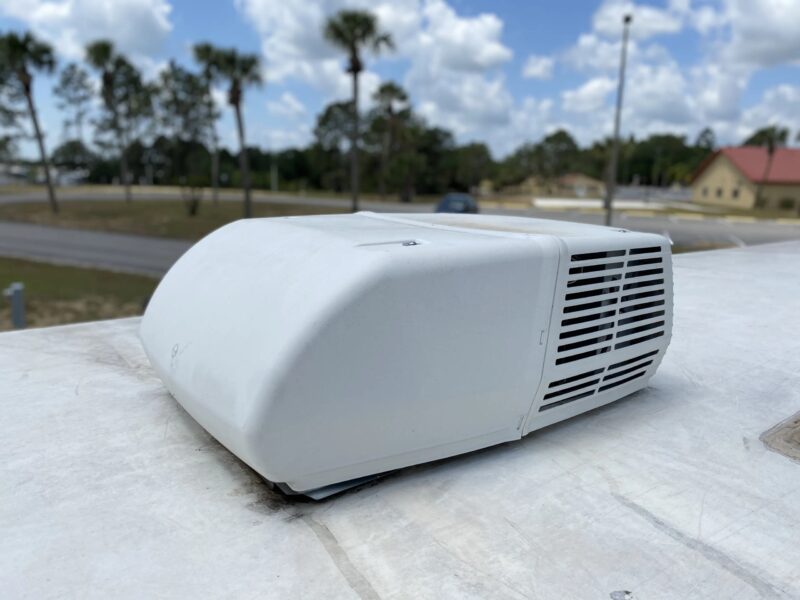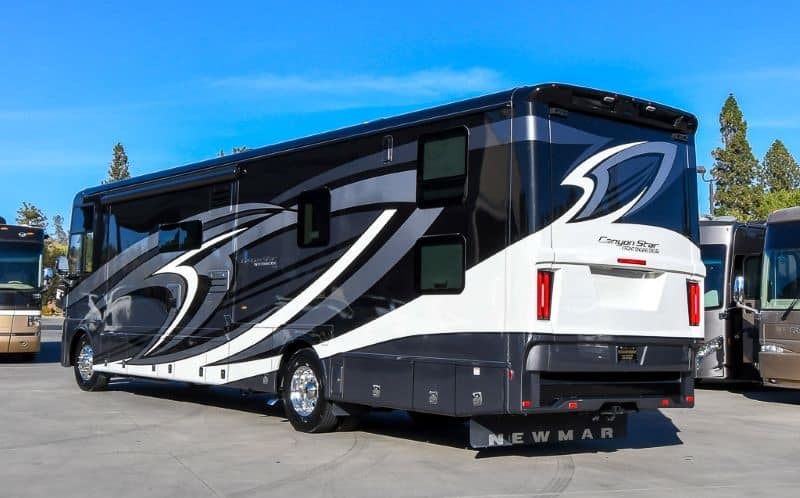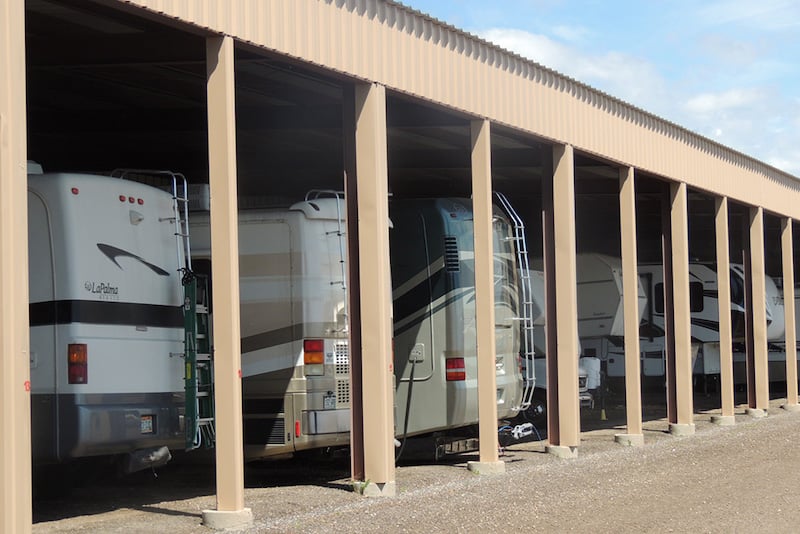RV A/C units make the difference between a sweltering afternoon and a relaxing afternoon, kicked back on the sofa, reading a book, or watching a movie. When you’re caught in the middle of a heat wave, however, watching that A/C work, non-stop, for hours on end may give you cause for concern.
It’s a machine, after all, and nothing lasts forever. How long can it possibly hold out when it never gets a break? It’s a legitimate concern if you live in your RV or are a long way from home, and RV A/C units aren’t exactly cheap to replace or repair.
Hooked into shore power, the A/C will run until it wears out, as long as there’s nothing wrong with it and it’s well-maintained. Running on a generator or battery power is a bit different, though that’s less about the A/C unit and more about the power source.
Should You Run RV A/C Units All the Time?
RV A/C units are a convenience, not a guarantee. We managed to make it as a species for thousands of years without such modern conveniences. A/C units have probably done more to alter human expectations of convenience than any other technology in the last century.
We naturally expect it, the moment we walk into a building. However, there is no such thing as an infinite air conditioner. Technically, it should run for as long as it has the power to do so. But it does create wear and tear on the unit, over time.
RV A/C units are fairly robust, for the most part, but they aren’t fail-proof. The typical RV warranty is two years, so there is a reasonable expectation that it will last at least that long. Keeping it well-maintained by inspecting it periodically, replacing filters, cleaning any drains, and washing your inner coils will maximize the longevity.
If it’s a nice 70 °F (21.11 °C) to 80 °F (26.67 °C) outside, don’t bother running it. A pleasant breeze on a nice day is more than enough to keep your RV cool, without the A/C unit.
How Long Can You Run Your RV A/C?
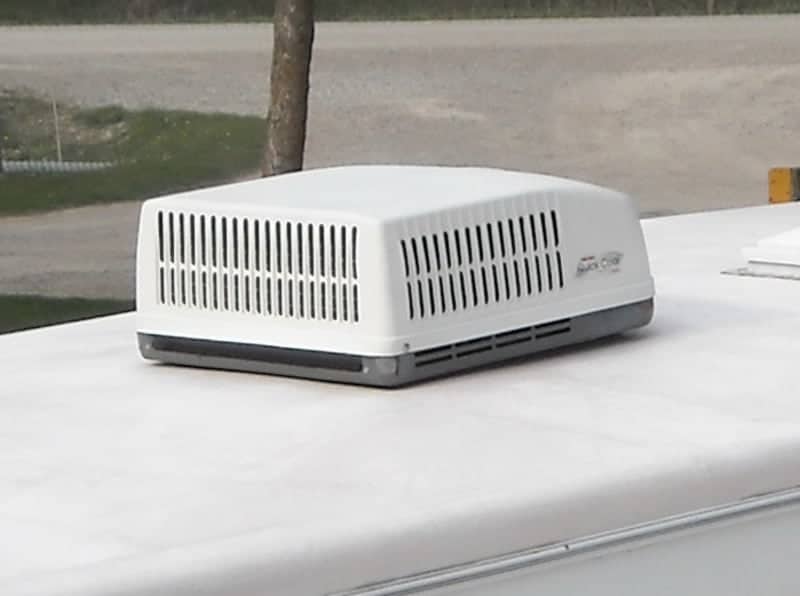
Technically, RV A/C units are capable of running indefinitely. If you’re worrying about running it all day and night, it’s fine, as long as you have the requisite power source. Its power source considerations and the inevitable entropy of all appliances are the only hindrances for an A/C unit.
The more you run it, the more wear and tear you place on it, and the faster the ultimate expiration date approaches. It’s a safer bet to avoid running it unless it’s necessary to stay cool.
Can Your RV A/C Unit Overheat?
It can, and it’s likely that the ball bearings (mentioned above) in the fan motor are the first things to go. The reason is they’re small, and they experience a ton of friction. Usually, a good cleaning of the coils will return your A/C to good working order but, once the bearings go, there’s no cleaning your way out of it.
While the compressor does generate heat over time, it’s more of a contributing factor, adding its heat to the heat generated in the fan motor. Although it’s possible for the compressor to overheat, it’s not nearly as common as the fan motor.
Dirty and clogged filters will cause overheating as well, which is why general, preventative maintenance for RV A/C units is critical. Back to the condenser fan motor, as the only thing that generates airflow over your condenser coil, overheating is a serious problem.
Age is often the culprit in a well-maintained RV A/C unit. The problem is, when your A/C unit is old enough for the ball bearings to start breaking down, it usually spells replacement, rather than repair. Also, anytime you’re cleaning, maintaining, or just running your A/C in general, you should keep the windows and doors shut.
The harder it has to run to maintain the internal temperature of the RV, the more the odds of overheating increase, especially in RV A/C units that are on their last legs.
Why is My RV A/C Unit Freezing Up?
Overheating and freezing may exist on opposing sides of the spectrum, but many of the issues that cause one may also cause the other. Poor maintenance or irregular filter changes may produce excessive heat or cause your A/C unit to freeze up.
Here are three of the most common reasons that RV A/C units freeze up:
1. Dirty or Damaged Fins
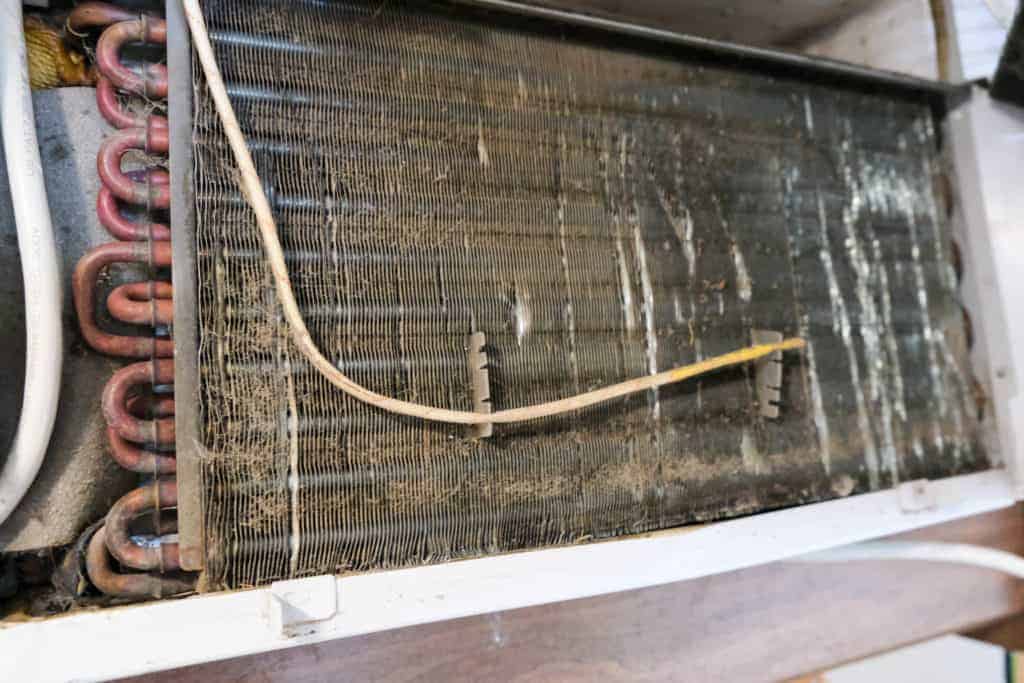
Dirty or damaged fins reduce the airflow. You should check them over at least twice per year. If you notice that any of them are bent, you can gently unbend them and use a vacuum cleaner to suck any debris or dirt caught inside the fins.
One of the best methods for straightening bent or deformed fins is to take a fine-tooth comb and brush it, straight down and straight up, just like you would brush your hair.
2. Temperature and Fan Settings
Temperature and high humidity affect your A/C in a lot of ways, mostly in a bad way. High-humidity areas tend to create frozen water on the coils, especially when the A/C unit is working overtime. This is especially true if you run your fan on low all the time, or reduce it from high to low suddenly.
Rather than change the fan settings, stick with changing the temperature while allowing the fan to remain on high. As long as it’s on high, the air continues to pass through too quickly to allow moisture to settle.
3. Temperature Sensor
Temperature sensor location is crucial. Oftentimes, it gets sucked up through the fins, or it shifts position. Its proper position is typically on the left side of the evaporator fins, about an inch or so from the bottom.
Are RV A/C Units Designed to Run Continuously?
Manufacturers design RV A/C units to run continuously without overheating or otherwise malfunctioning. However, they don’t design them to run forever. That would be a really neat hat trick, and no one would ever need to purchase an RV A/C unit again.
As the A/C unit runs, components within break down over time. We replace them as it happens and to the best of our capabilities. However, no matter how much we replace, eventually, the entire A/C unit has to go. On the bright side, there are some benefits to running your RV A/C continuously.
Advantages Of Running A/C Units Continuously
- Consistent temperature control
- A/C unit doesn’t have to overwork to rapidly cool a hot RV
- Reduces allergens in the RV, thanks to constantly filtering with the windows closed
- You don’t have to constantly mess with the thermostat
None of the above is possible if you don’t maintain your A/C though. This leads us to some disadvantages of running your RV A/C unit all the time.
Disadvantages Of Running RV A/C Units Continuously
- The more you run it, the more you have to maintain it
- You have to keep your fan the same speed, even as the temp drops, to avoid freezing your evaporator coils
- Energy consumption
- The compressor motor continually generates heat
- Ball bearings in the fan motor will eventually go bad
More maintenance usually comes in the form of cleaning, especially where the evaporator coils are concerned. They get dirty over time, just like they do in a residential set-up. If you don’t clean them, they freeze, ironically destroying your RV A/C unit’s ability to cool your motorhome.
Can RV A/C Units Be Recharged?
Since RV A/C units are closed systems, they don’t have an ingress point for refilling the refrigerant. To refill it, an A/C tech would have to remove the plastic casing, or shroud, from your RV’s A/C unit and insert a line tap to both refill and check refrigerant levels.
For the most part, this never happens, and you would have to purchase a new unit. However, you can do it yourself by purchasing your own refrigerant, installing the line tap, checking your levels, and refilling it yourself.
Keep in mind, that this is not a job you should take on yourself if you’re not certified to do so. However, it’s your A/C unit, so just make sure you follow your state’s laws concerning refrigerant use and disposal.
5 Ways to Keep Your RV Cool
Using the RV A/C is one way to keep your RV cool, but there are other ways to cool off in the summer without running the air conditioner constantly.
1. Park in the Shade
Shade doesn’t actually make anything cooler. The air temp is still the same. Standing in the sun just makes it feel a lot hotter, and shady areas provide relief. What it does for an RV is remove the one thing that is slow-cooking it—the sun. It’s especially nice if you have a bit of a breeze to go along with it.
The more surface area on your RV is exposed, the more the sun will increase the temperature of your RV’s shell, making your A/C unit work harder.
2. Cook Outdoors
Sure, it’s hot outdoors. However, running an oven and stove top inside the RV easily increases the interior temperature. Besides, the fewer bodies gathering around the kitchen lowers the body heat as well.
Many of you know that Mike from RVBlogger (he owns this website too) loves pizza! He and Susan just bought a pizza stone that fits on their grill so Mike can cook his pizza outside and stay cool inside their rig!
3. Open Windows and Doors
This isn’t the best course of action if your RV is parked in broad daylight. But, with a nice breeze flowing through and plenty of shade, it’s the perfect opportunity to cut the A/C off and let nature do its thing.
Open windows will cool the interior of the RV faster than you think, especially if the temperatures outside aren’t particularly brutal.
4. Use Your Exhaust Fans
Heat rises. Your exhaust fans are on the ceiling. The rest is a matter of physics. If you have your windows open, cool air comes in, with the hotter portion rising to the ceiling for the exhaust fans to remove.
5. Keep Up on A/C Maintenance
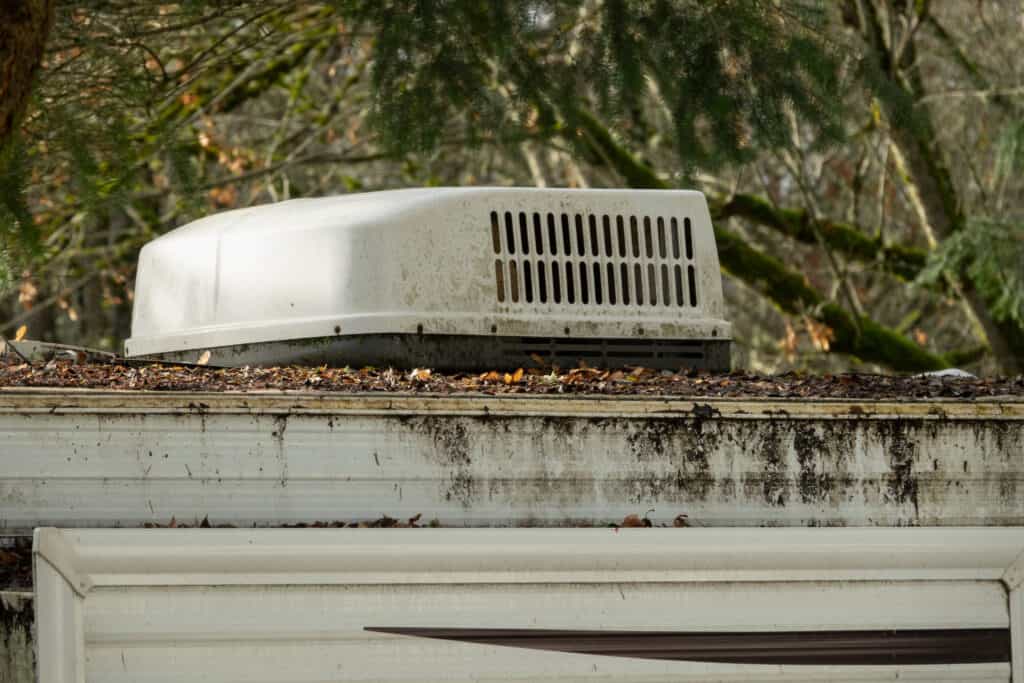
Preventative maintenance is your best friend with any A/C system. With an RV system, it’s a lot simpler than a residential one. Be sure to change your air filters periodically, especially if you can see they are getting dirty.
Every six months, vacuum, clean, and straighten your fins and make sure there is no dirt or debris on the coils or caught up inside or around the fans.
Be sure to clean out wasp, bee, or yellow jacket nests. They love A/C units. It’s best to do that part at night when most stinging insects are pretty lethargic.
Final Thoughts About RV A/C Run Time
RV A/C units won’t last forever, though you can run them constantly. If you want the most out of them, preventative maintenance is a must. When they’re scheduled for cleaning, even if it’s a bad day and you don’t feel like it, there’s nothing for it but to get it done.
If not, you’ll simply have a bad day or two later on down the road. While no one expects a neverending A/C unit, you can make the most out of it while you have it.
Related Reading:
1. Why Does My RV Furnace Blow Cold Air?
2. Can I Run My Motorhome Rooftop A/C While Driving?
3. Are Dual-Pane Windows In an RV Worth It?
4. How Much Freon Does Motorhome A/C Hold
About the Author:
Thomas Godwin is a full-time freelance writer with a BFA in Creative Writing, a U.S. Marine, and an avid outdoorsman.
When he’s not writing, he’s raising chickens and Appleyard ducks. Thomas also constructs teardrop campers (attempting to anyway) and kayaks the Blackwater River with his wife, two daughters, and his Dobermans.


